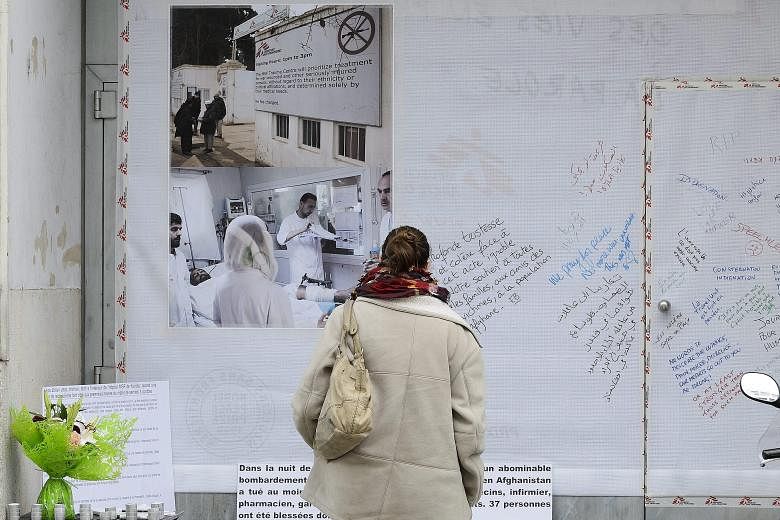WASHINGTON • President Barack Obama has personally apologised to the head of Doctors Without Borders for what he described as the mistaken US bombing of its field hospital in Kunduz, Afghanistan, promising a full investigation into the episode which killed nearly two dozen doctors and patients.
But five days after an American AC-130 gunship bombed the medical facility, Mr Obama's expression of regret in a telephone call from the Oval Office appeared to do little to satisfy the leader of the doctor group, who issued a terse statement saying the US President's apology had been "received".
Dr Joanne Liu, global president of Doctors Without Borders, repeated her demand for an independent investigation led by the International Humanitarian Fact- Finding Commission to "establish what happened in Kunduz, how it happened, and why it happened".
White House officials said the President had confidence the probe under way, including an inquiry being conducted by the Department of Defence, would be "transparent", "thorough" and "objective".
Direct presidential apologies to victims of US actions abroad are rare, but not unheard of.

In 2012, Mr Obama wrote a letter of apology to President Hamid Karzai of Afghanistan after several copies of the Quran were burned by US military personnel, leading to violent protests across that country. In 2004, then President George W. Bush apologised for the treatment of Iraqis at the Abu Ghraib military prison, telling world leaders he was "sorry for the humiliation".
Whether or not to deliver an apology is a sensitive decision for any president, but particularly for this one. Mr Obama has been pilloried since the start of his presidency by Republicans who accuse him of being a serial apologiser for the US. Mr Mitt Romney, the Republican candidate for president in 2012, wrote a book titled No Apology, a not-so-subtle dig at Mr Obama.
And former vice-president Dick Cheney recently published a book renewing the apology criticism of Mr Obama.
In this case, Mr Obama proceeded with caution. Two days after the bombing, he expressed his "deepest condolences" to families of the hospital victims, calling it a "tragic incident". But he and other White House officials resisted further comment for several days.
That changed on Wednesday, after grim and detailed congressional testimony by General John Campbell, the US commander in Afghanistan, who told lawmakers the attack was "a US decision made within the US chain of command".
White House press secretary Josh Earnest later said that "when the United States makes a mistake, we own up to it, we apologise". He explained the shift in the decision to apologise by saying Mr Obama had concluded "that he had learnt enough about this matter to conclude that it was appropriate for him to offer an apology".
White House officials said Mr Obama told Dr Liu he would make any changes necessary to ensure that such incidents were less likely in the future. And they said that he promised a "full accounting" of who was to blame, and whether the military's rules of engagement need to change.
That may not be enough for Doctors Without Borders. In her statement, Dr Liu reiterated the group's request that the US "consent to an independent investigation led by the International Humanitarian Fact-Finding Commission".
The commission is made up of 15 members, elected by the 76 countries that recognise its authority. Neither the US nor Afghanistan is among the 76. The commission was created in 1991, but has never been used.
NEW YORK TIMES

